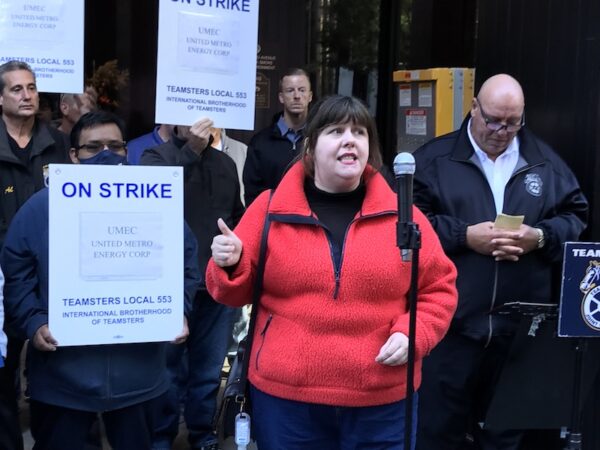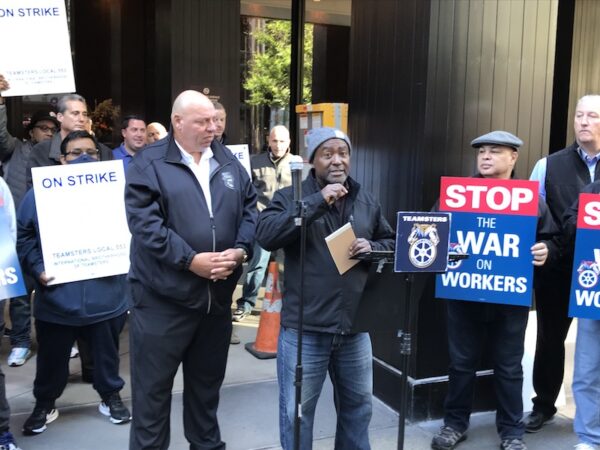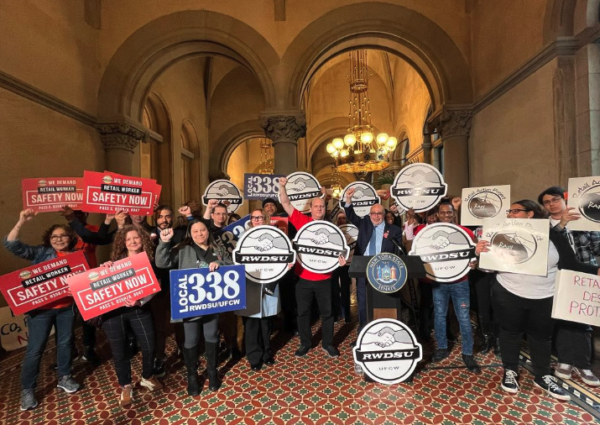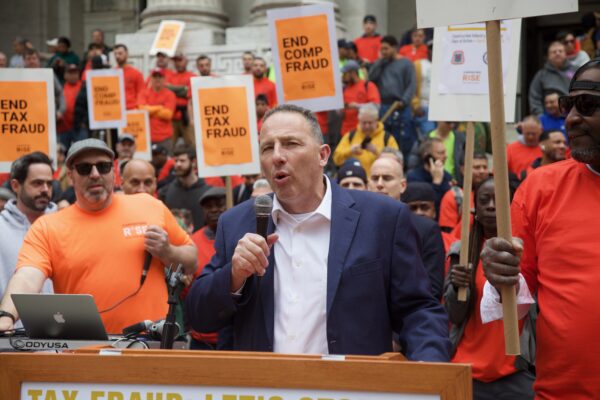
NEW YORK, N.Y.—Workers on strike at the United Metro Energy Corporation fuel terminal in Brooklyn marked the six-month anniversary of their walkout October 19, with a rally outside the Midtown offices of billionaire owner John Catsimatidis.
“There’s a reason for this,” Teamsters Local 553 secretary-treasurer Demos Demopoulos told the roughly 50 supporters there. “The man can afford it. We’re talking about paying 14 people the same wages and benefits as the rest of the industry.”
The 14 workers walked out Apr. 19, after more than two years trying to win their first union contract. They voted to join Local 553 in February 2019. The main issues are pay, benefits, and rights on the job, union activist André Soleyn told LaborPress before the rally.
United Metro pays significantly below industry standards, says Demopoulos. For example, Soleyn gets $26 an hour, while workers at other fuel companies in the city get $36 for the same job.
Their current medical coverage, Soleyn says, has high copayments and such a narrow network of doctors and hospitals that “you have to do a big exhaustive search to find anybody that accepts it.”
The workers also want a real pension, while Catsimatidis is offering a 401(k) plan, says Demopoulos.
Finally, they can be fired at will. “You are on edge — you are wondering will your number be next,” says Soleyn.
Eight of the 14 strikers have been terminated, with Soleyn the first one, on Apr. 19. He had worked there since 2015. A terminal operator, he ran the machinery that transfers diesel fuel, heating oil, and gasoline from ships to storage tanks to trucks, while also keeping track of inventory and the trucks arriving.
Soleyn says a company lawyer told Demopoulos that his being axed first was “the luck of the draw.” He laughs when it is suggested that the reason was “pour encourager les autres” — a sardonic French phrase for an execution intended “to encourage the others.”
Local 553 filed an unfair labor practice complaint with the National Labor Relations Board [NLRB] in September, alleging that the firings were illegal retaliation against union supporters.
“We have met with Local 553 more than 16 times and we have negotiated and continue to negotiate in good faith during every single meeting; we have also made significant concessions on both economic and non-economic terms,” Catsimatidis responded in a statement to LaborPress. “Workers were hired to permanently replace those on strike because we need to operate our business successfully and safely.”

The company, he continued, has 100 other employees at the terminal, on Newtown Creek in Greenpoint, including 25 truck drivers who are Local 553 members and not on strike, all of whom depend on their wages.
“I have been in business for 51 years and this is the first strike I have had, and significantly, almost every single one of our companies has union members,” Catsimatidis concluded
“I think the company’s not negotiating fairly with us, because they schedule meetings so few and far between,” Soleyn says. “There was always this push not to have the union.”
A 55-year-old immigrant from the Caribbean island of St. Vincent and the father of three daughters, he says the company knows the prolonged strike is hard on the workers and their families.
“After six months, anything you have saved is drained,” he says, “You have kids in school, kids in college.” But strikers have been picketing every day, and none have crossed the line, he adds.
“Two years of negotiations is not bargaining in good faith,” Assemblymember Amanda Septimo (D-Bronx) told the rally. Outgoing Comptroller Scott Stringer and two Greenpoint elected officials, Assemblymember Emily Gallagher and City Councilmember-elect Lincoln Restler, also spoke.
Demopoulos said the two sides are “far apart,” but there’s another negotiating session scheduled for later this week. He told LaborPress that he’d run into Catsimatidis earlier and “reminded him about how long it’s been, and he agreed.”
With a net worth of almost $4 billion, he added, there’s no reason why Catsimatidis can’t pay 14 workers what others get for doing the same kind of work.
Another issue is whether the eight sacked strikers will be able to get their jobs back after being told that they’d been “permanently replaced.” Employers have the legal right to hire permanent replacements in a strike over economic issues, but not if the NLRB rules that it was retaliation for union activity.
“We’ll prevail on that,” Demopoulos says.



